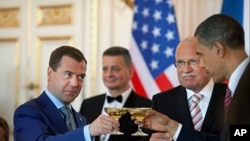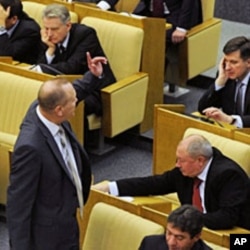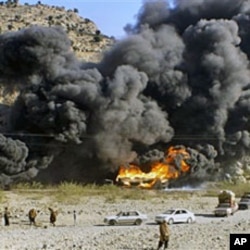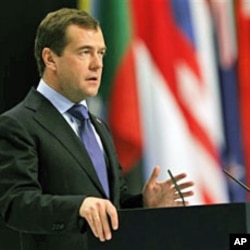The highlight was the U.S. Senate's ratification in late December of the New Strategic Arms Reduction Treaty - or New START.
Vice President Joe Biden, in his capacity as president of the Senate, read out the final tally.
"71 yeahs, 26 nays, two-thirds of the Senate present having voted in the affirmative, the resolution of ratification is agreed to," said Biden.
Shortly after Senate ratification, President Barack Obama addressed reporters.
"This is the most significant arms control agreement in nearly two decades and it will make us safer and reduce our nuclear arsenals along with Russia's," the president said.
The Senate action represented a major victory for President Obama, who has made better relations with Moscow a cornerstone of his foreign policy.
The New START treaty sets a limit of 1,550 deployed strategic - or long-range - nuclear warheads. It also limits to 700 the number of operationally deployed strategic nuclear delivery systems such as long-range launchers and heavy bombers. The accord also provides for what the Obama administration calls strong verification measures - provisions that ensure each side complies with its treaty obligations.
The treaty now has to be ratified by the Russian parliament - or Duma - and by the Federation Council, Russia's highest legislative body. Experts say passage is virtually guaranteed.
John Parker with the National Defense University [expressing his personal views], says the New START treaty is as important to Russian President Dmitry Medvedev as it is to President Obama.
"Since he [Medvedev] was intimately involved in negotiating it person-to-person with President Obama, it's important. He invested a lot of time in it and when it's ratified [by the Duma/Federation Council] he will, I'm sure, take a lot of political credit for it. So it's important," said Parker.
Many experts are now looking at what might be the next step in arms negotiations between Washington and Moscow. One of those is Steven Pifer with the Brookings Institution.
"When he signed the New START Treaty back in April, President Obama made clear that he would like to continue and in the next negotiation, address not only deployed strategic forces but address non-deployed strategic warheads - for example those nuclear warheads that are sitting in storage areas - and also address non-strategic or tactical nuclear weapons," said Pifer.
"And that opens up for the first time that the United States and Russia might be negotiating limits on all of their nuclear arsenals with the exception of those weapons that are in the dismantlement queue," Pifer continued. "That's going to be a hard negotiation because the sides will get into questions that they haven't had to address before."
Many analysts say the START negotiations and ratification process overshadowed other positive developments in US-Russia relations.
Robert Legvold of Columbia University says one of those was Moscow's increased cooperation in Afghanistan.
"The most important element has been supporting transit of military equipment to Afghanistan. In the past, the U.S. has been more than two-thirds dependent on supply lines that cross the western border of Pakistan and that are vulnerable both to the insurgency in the area and at times the Pakistan government, when they protest American military actions," said Legvold.
"So the fact that the Russians now enable both on land and air the transit of both non-lethal and lethal - that is military equipment to Afghanistan - is a critical element in sustaining the military U.S. and NATO effort within Afghanistan."
Experts say Moscow also toughened its position on Iran, voting in favor of a United Nations Security Council resolution imposing new, tougher sanctions on Tehran - although the text was apparently watered down by Russia and China. Russia also canceled the delivery to Iran of S-300 anti-aircraft missiles - a deal dating back to 2007.
Russia also changed its position on missile defense. After strongly criticizing for many years U.S. plans for such an endeavor, Moscow agreed to cooperate in a NATO-led missile defense system.
Once again John Parker with the National Defense University.
"Politically it's very important. [Russian President Dmitry] Medvedev signaled a readiness to cooperate in discussions with NATO on European missile defense. What it will eventually turn out to be it's pretty hard to tell, but at least the two sides are going to be talking. So they are going to talk about how this cooperation might work out," said Parker. "The important thing for the Russians is that they are in on the ground floor on all of this and not just handed a plan and asked to sign up to it."
Looking ahead, experts say Moscow and Washington should build on the progress made in 2010. A key event in 2011 will be the expected review of Moscow's application to become a member of the World Trade Organization - an application supported by the Obama administration.







